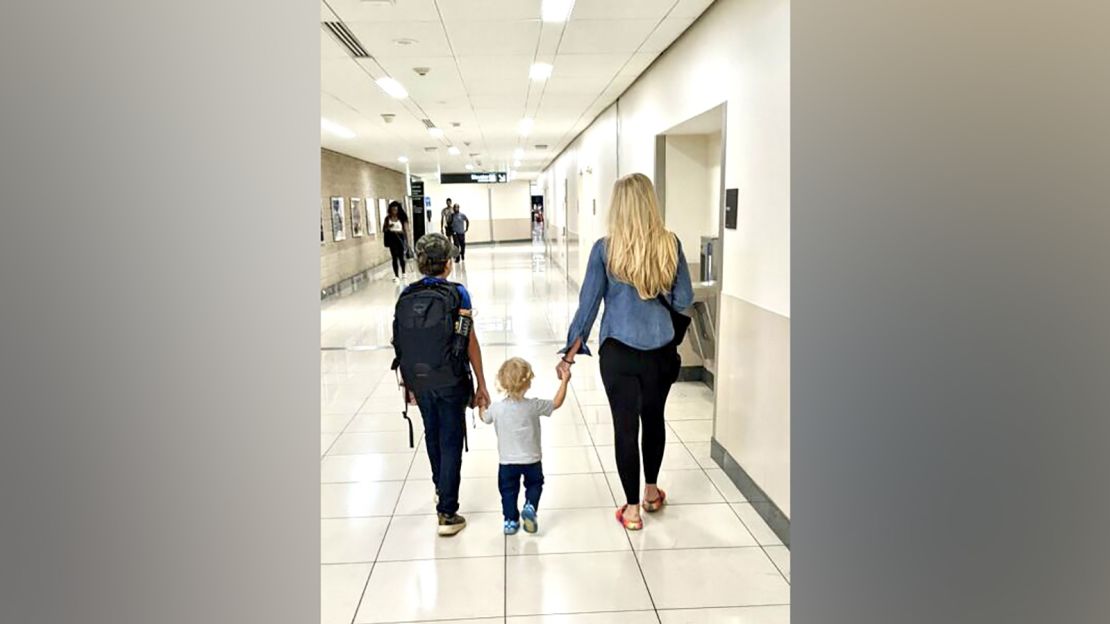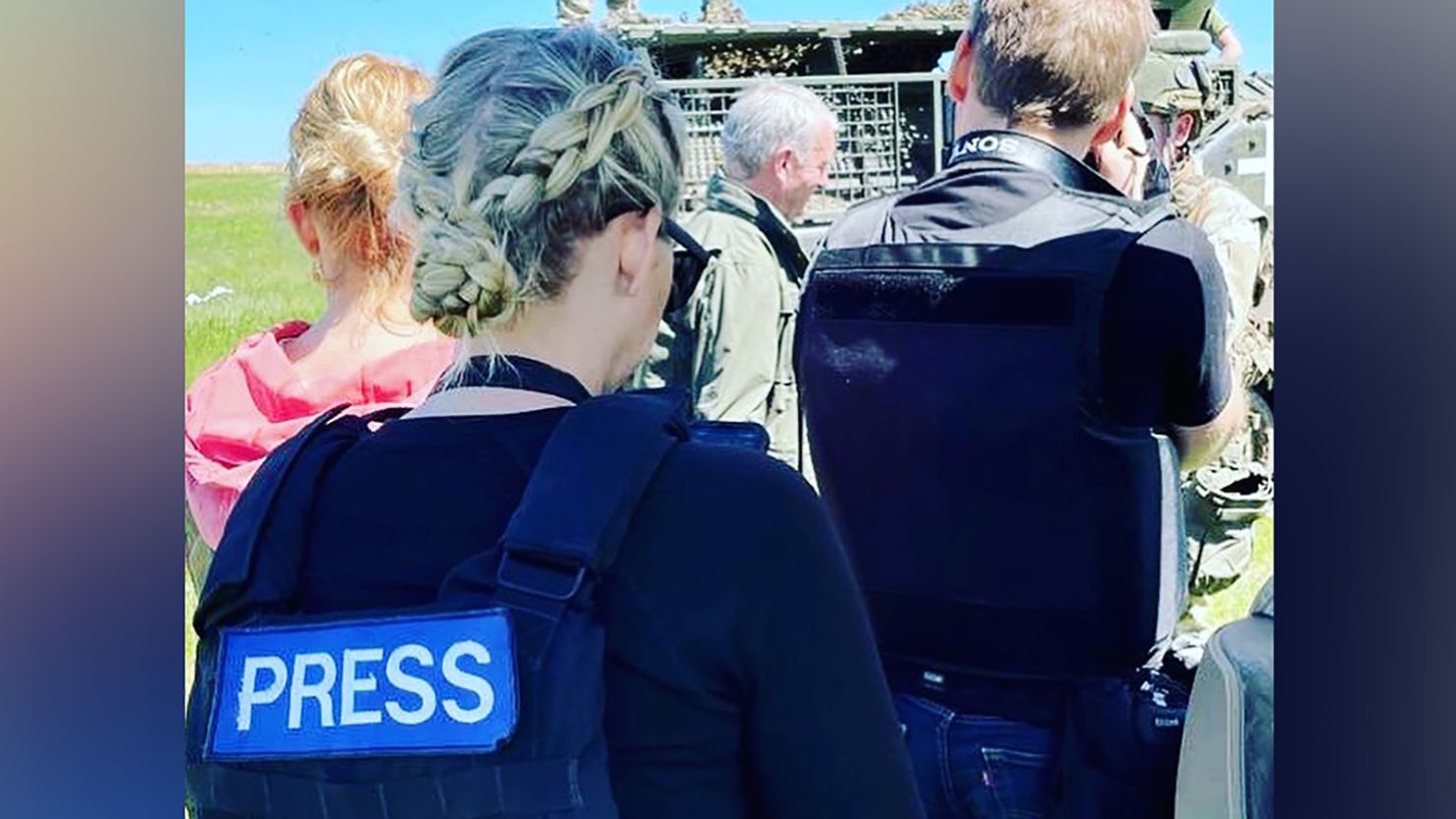Editor’s Note: Brianna Keilar co-anchors “CNN News Central” from 1-4p.m. ET. AnneClaire Stapleton is a senior international news editor and producer at CNN, currently producing stories from the frontlines in Ukraine. Both are proud military spouses. The views expressed in this commentary are their own. View more opinion on CNN.
The last time we saw each other in person, we were both in Ukraine, just weeks after the war began, surprised to bump into one another in a hotel lobby in Lviv.
We caught up briefly on family stuff. How are the kids? Is your husband deploying anytime soon? We also noted the role reversal: We are military spouses, and here we were, working in a war zone, while our husbands were at home with the kids.
In our families, it’s usually the opposite.
We’ve bonded over the phone over the years, living in different cities, talking about military family life and the challenges surrounding deployments.
While those have been many, we have been spared some of the hardest parts of military life: We both married into the military later in life, when our careers were well-established. Neither of us has had to move – or make a PCS (permanent change of station) in military parlance – with our husbands.
Their service has impacted our careers and made them logistically challenging, but it hasn’t forced us out of our field.

That makes us outliers.
Almost a third of active duty military spouses are unemployed – 32%, according to the D’Aniello Institute for Veterans and Military Families at Syracuse University.
So, today – on Military Spouse Appreciation Day – we want to recognize our nearly 1 million fellow active duty US military spouses by highlighting what would really make them feel appreciated: a job.
Military spouse unemployment threatens military readiness
Employment was the top concern among active-duty military spouses for the sixth year in a row, according to the Blue Star Families annual lifestyle survey.
Their Depression-level unemployment is not for a lack of education. Military spouses are significantly more educated than average Americans, but constant moves, employment gaps on resumes, lack of opportunities in different industries, non-flexible remote work options and a lack of awareness by employers on what military spouses bring to the table are often insurmountable barriers to employment.
In a society where two incomes are often essential to a family’s economic security, this statistic explains one of the most jaw-dropping recent trends among service members: according to a RAND report of food insecurity among members of the armed forces and their dependents, 26% of service members are food insecure.
The Pentagon and policymakers increasingly view military spouse unemployment as a threat to the readiness of the nation’s all-volunteer military.
How does a service member focus on the mission when they’re worried their kids aren’t getting enough to eat? Why stay in the military if leaving means financial security, with both spouses now able to find gainful employment?
Military spouses are assets in the workforce, not liabilities
While military spouses are longing for work opportunities, companies are missing out by automatically excluding them from applicant pools due to gaps in employment or failing to provide occasional accommodations to retain them as employees.
Much like veteran applicants who once suffered significantly above average unemployment and now have lower unemployment rates than the national average following years of concerted hiring efforts, military spouses are assets, not liabilities.
In addition to higher levels of training in their fields, military spouses bring the perseverance that military family life inevitably teaches: fixing problems without complaining, adapting to circumstances they don’t control and navigating complex group dynamics. Aren’t these all things bosses say they desperately want in employees?
To retain these workers, flexibility during moves, deployments and periods of training is key.
That was a bigger ask of employers before the Covid-19 pandemic, but remote work is now a widely accepted tool, especially if employers don’t want to take a loss on the investments they have made in employees.
National Guard families like AnneClaire’s bear a unique burden, especially when the service member owns their own business.
When AnneClaire’s husband is in training or deployed, their joint income decreases considerably, but their expenses, specifically child care, go way up to compensate for his absence. These are the times when work flexibility matters the most for a spouse like her.
When he’s home, she can hand over primary parenting duties to him and press the gas pedal at work, traveling extensively as stories demand, like she is right now, reporting from the front lines of the war in Ukraine.
There are no specific federal protections for military spouse employment
While there are numerous federal protections for service members, including men and women serving in the Guard or Reserves who leave civilian jobs when called up, there are no specific federal protections regarding employment for military spouses during these vulnerable times in military family life. Without company policies, experiences vary.
Military spouses often find that an understanding boss who works out a plan that serves the company while also serving the needs of a military family can make all the difference. A boss who doesn’t leaves them with little option but to quit their job.
When we looked to see what companies around the country are doing to hire and retain military spouses, we found few companies that have official policies in place specific to military spouse employees. Among those leading the charge were T-Mobile, USAA and Wells Fargo.
But far too many companies aren’t even aware if they employ military spouses. Sometimes they don’t advertise their status, fearful they’ll be discriminated against if an employer knows a move may be on the horizon.
Leave policies touted by some companies as generous are often just federally mandated provisions
CNN contacted over 60 companies that partner with the Department of Defense Military Spouse Employment Partnership (MSEP). These are companies that pledge and commit to recruit, hire, promote and retain military spouses.
Many companies tout generous leave policies for these workers, but often it’s just the unpaid leave they’re legally required to provide under the Family and Medical Leave Act (FMLA). Currently, the FMLA requires up to 12 weeks of unpaid job-protected leave for making child care arrangements or attending official military ceremonies related to deployment and 26 weeks of unpaid leave to care for an injured or ill service member with a qualifying condition.

Only military spouses who work for a private company with at least 50 employees or a government agency are eligible for these benefits. Smaller companies are exempt from providing this leave.
And again, it’s unpaid.
Think about that. Imagine learning your spouse has been injured while serving. It’s what all military spouses worry about, and AnneClaire has been there, her mind going into overdrive. Where is my spouse? Can I get to him? Who will take care of our kids if I leave? Will this injury change our lives forever? Thankfully, his injury did not.
In these life-altering moments, should military spouses also have to ask: What about my job? Or, can we afford groceries this month if I stay home to take care of my injured spouse?
Before deployments, military couples go over every detail of what happens if our spouses are killed in action. Service members are required to complete a death plan; in the army it’s called a Personal Affairs Worksheet (PAWS). On multiple occasions, we’ve discussed with our spouses intimate details of what happens if they are killed in action (KIA).
A few of the questions asking on PAWS: Who should escort his body home? Do we want a military or civilian funeral? It’s also noted in the PAWS packet, if you want to be buried in Arlington, there’s typically a three to four month wait. What songs are to be played during his funeral? Who will be his pallbearers? What do we want on his headstone? Who will give his eulogy?
The purpose is so military spouses aren’t tasked with figuring all this out when the worst happens. Do civilian couples also have these conversations?
Military spouses in journalism
We live in a nation where less than half of 1% of the population serves in the military and few are military-connected, yet many of the stories we cover as journalists touch the lives of this population and the work that they do.
When we look around our newsrooms – including in Atlanta and Washington, DC, where we are based – we wish there were more of these men and women among our ranks, enriching the coverage of some of the most important stories we report with the hard-earned knowledge from their unique life experiences.
We know a lack of diversity in journalism can cause editorial blind spots and our goal, above all else, is to get the story right.
So, we have begun to tackle the issue of attracting and retaining military spouses internally at CNN and have been so encouraged by the receptivity of our company’s leadership. We hope that’s the case for other newsrooms, national and local.
Like in any company, the benefit will go both ways.
Editor’s Note: This article has been updated with the latest Department of Defense estimates on food insecurity among military families.







